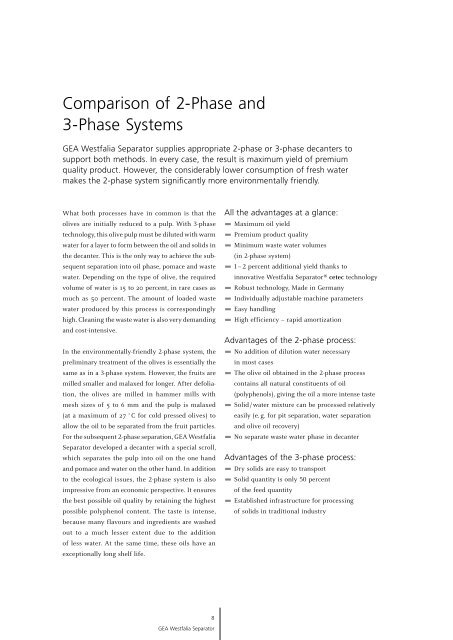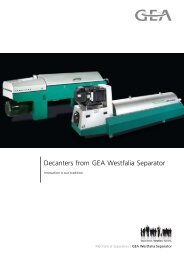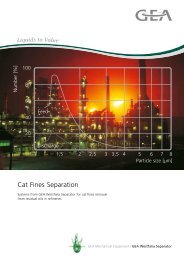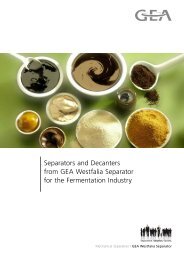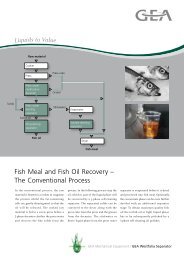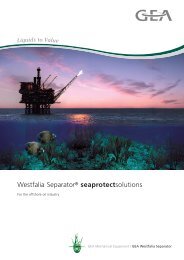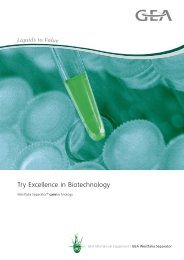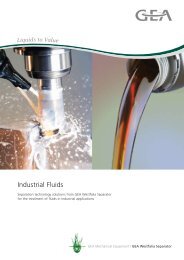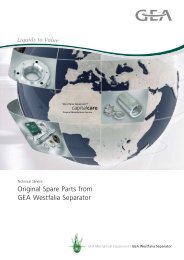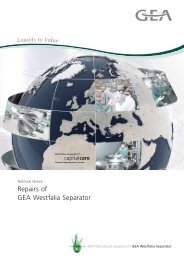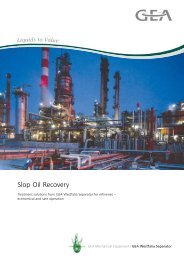Olive Oil Recovery pdf, 1.9 MB - GEA Westfalia Separator
Olive Oil Recovery pdf, 1.9 MB - GEA Westfalia Separator
Olive Oil Recovery pdf, 1.9 MB - GEA Westfalia Separator
You also want an ePaper? Increase the reach of your titles
YUMPU automatically turns print PDFs into web optimized ePapers that Google loves.
Comparison of 2-Phase and3-Phase Systems<strong>GEA</strong> <strong>Westfalia</strong> <strong>Separator</strong> supplies appropriate 2-phase or 3-phase decanters tosupport both methods. In every case, the result is maximum yield of premiumquality product. However, the considerably lower consumption of fresh watermakes the 2-phase system significantly more environmentally friendly.What both processes have in common is that theolives are initially reduced to a pulp. With 3-phasetechnology, this olive pulp must be diluted with warmwater for a layer to form between the oil and solids inthe decanter. This is the only way to achieve the subsequentseparation into oil phase, pomace and wastewater. Depending on the type of olive, the requiredvolume of water is 15 to 20 percent, in rare cases asmuch as 50 percent. The amount of loaded wastewater produced by this process is correspondinglyhigh. Cleaning the waste water is also very demandingand cost-intensive.In the environmentally-friendly 2-phase system, thepreliminary treatment of the olives is essentially thesame as in a 3-phase system. However, the fruits aremilled smaller and malaxed for longer. After defoliation,the olives are milled in hammer mills withmesh sizes of 5 to 6 mm and the pulp is malaxed(at a maximum of 27 ° C for cold pressed olives) toallow the oil to be separated from the fruit particles.For the subsequent 2-phase separation, <strong>GEA</strong> <strong>Westfalia</strong><strong>Separator</strong> developed a decanter with a special scroll,which separates the pulp into oil on the one handand pomace and water on the other hand. In additionto the ecological issues, the 2-phase system is alsoimpressive from an economic perspective. It ensuresthe best possible oil quality by retaining the highestpossible polyphenol content. The taste is intense,because many flavours and ingredients are washedout to a much lesser extent due to the additionof less water. At the same time, these oils have anexceptionally long shelf life.All the advantages at a glance:Maximum oil yieldPremium product qualityMinimum waste water volumes(in 2-phase system)1 – 2 percent additional yield thanks toinnovative <strong>Westfalia</strong> <strong>Separator</strong> ® cetec technologyRobust technology, Made in GermanyIndividually adjustable machine parametersEasy handlingHigh efficiency – rapid amortizationAdvantages of the 2-phase process:No addition of dilution water necessaryin most casesThe olive oil obtained in the 2-phase processcontains all natural constituents of oil(polyphenols), giving the oil a more intense tasteSolid / water mixture can be processed relativelyeasily (e. g. for pit separation, water separationand olive oil recovery)No separate waste water phase in decanterAdvantages of the 3-phase process:Dry solids are easy to transportSolid quantity is only 50 percentof the feed quantityEstablished infrastructure for processingof solids in traditional industry8<strong>GEA</strong> <strong>Westfalia</strong> <strong>Separator</strong>


